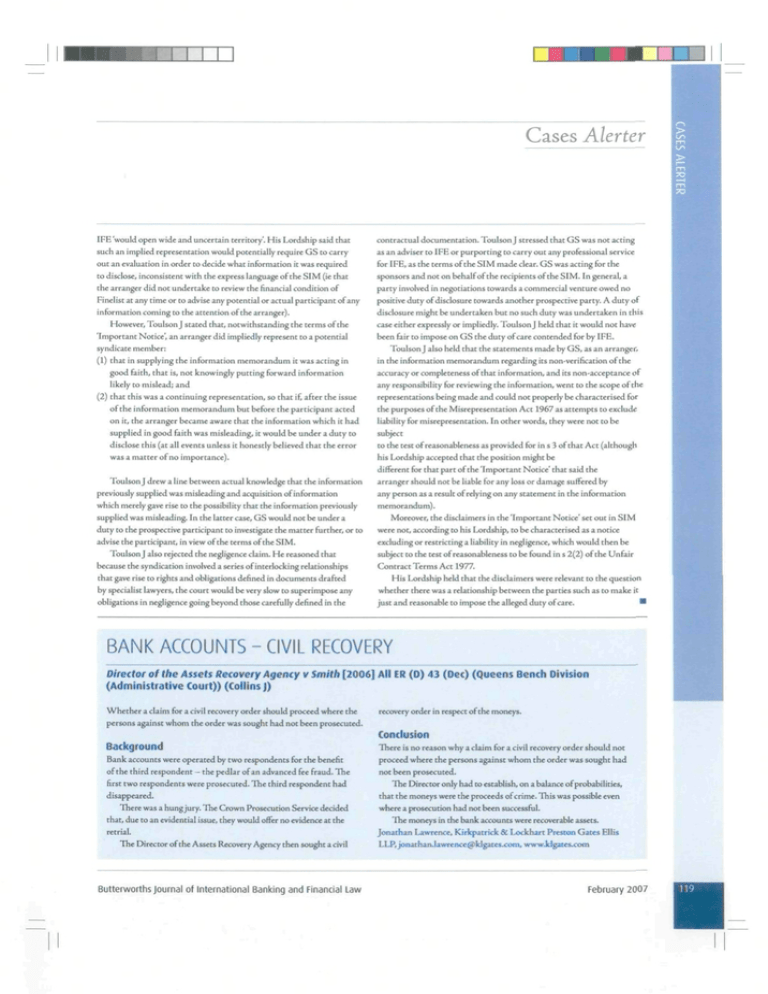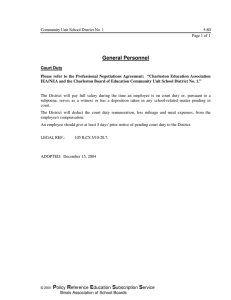Alerter
advertisement

Cases Alerter
IFB'would open wide a n d uncenain Mrritory'. Hia L o r d ^ i p said t h a t
i r o n t r a c i u a l d o o i m e n i a l r o n . T o u l s o n J s t r e s s e d t h a t G S was nor acting
suchanJmpliedrepresemaiion won LI pocenrially require G S to carry
asanadvi&er[0 If E or purporting to carry out any professional service
out an evaluatron in order to decide what information it was required
for ll-'K, as t h e [ e E m s o f i h e S l M made cleatrGS was ac[ing for [lie
todisclDsejini:onsis[ent ivich chc expre&slanguageofthe S I M (ie that
sponsors and not on behalf of the teciptenrs of the S I M . In general, a
i h e a r r a n g e r d i d n o t u n d e t t a k d to teviewtheRnancialcondilionof
par[y involved in negotiations towards a commercial venture owed no
Finelisiatany lime O t t o advise any potential or actual participant of any
positive duty of disclosure towards another prospective party. A duty of
jntbrnial ion comJngro [he accention of [he arranger].
disclosure might be undertaken b u t no such duty was undertaken in this
HoweverHToulsonJstaiedihai, notwithstanding the terms of the
Tmpnrtjnc Norice', m arranger did impliedly represenc lo a potential
syiidicare member!
(1) that m supplying the [nfotmation m e m o r a n d u m i t w a s acting in
case either expressly oriinpliedly. "I'oulsonJ held that it would not have
been fair to impose on G S the duty of care contended for by [E-B.
T o u l s o n j also held that the statements made by GSp as anartangefp
in the information m e m o r a n d u m regarding its non-verification of t h e
good ii'nW. rhar rs, nor knowingly putting forward information
accuracy or completeness of that information, and its non-acceptance of
likely Co misleadj a n d
any responsibility for reviewing the information, went to the scope of the
(2) thAlthis WAS a coniinuingrepresentationn-ui t h a t ifn after the [ssue
representations being made and could not properly b e characterised for
of Lheinformarion m e m o r a n d u m bun before [he participant acted
the purposes of the Misrepresentation Act 1967 as attempts to exclude
o n it, the arranger became awate t h a t the informaEion which ic had
liability for misrepresentation. En other words, they were not to be
supplied ]Ji good faith wa& misleading, it would b e under a duty lo
subject
disclDselhLs(at dll events unless it hone&tly believed t h a t t h e error
to the test of reasonableness as provided for in s 3 of t h a t A c t {although
WAsamarrerofnoimpotiance].
his Lordship accepted that the position might he
d i f f e r e n l f b r t h a t p a r t o f t h e ' I m p o r t a n t Notice'that said the
T o u l s o n j d r e w a line betwecnactual knowledge that the inEbrmation
arranger should not be liable for any Joss or damage suffered by
previously supplied was misleadinj^ and acquisition of mfornialion
any person as a r e s u l t o f relying o n any statement in the information
which merely gave rise co the possibility that the mfijrmatjon previously
me morandum).
supplied was misleading. In the latter case, G S would nor be under i
Moreover, the disclaimers in the Important Notice'set out in S I M
duty to [he prospective participant to investigate ihema[ifirfiirrher, or to
were riot, according to his l-ordship, c o b e c h a r a c t e r i s e d a s a n o t i c e
advise [he par[icipant, in view of the terms of [he SlMr
eitcludingorresiriciing,iliabili[y in neglige nee, which would then b e
Ibulson J also rejected the negligence claim. H e rcasoiLcd thar
because the syndication involved a series of imcHoeldngrclKionships
that i^ve rise to rights and obligations delined in d o c u m e n t drafred
subject [ o i h e t e s t o f t e a s o n a b l e n e s s t o b e f b u n d i n s 2 ( 2 ) o f d i c U n & i T
C o n t r a c t T e r m s Ac[ 1977.
H i s L o r d s h i p h e k l t h a [ i h e d i s c l a i m e r s were relevant to the questItMi
by specialist lawyers, the court would be very slow [osiiperimpose any
whetherrhere was A relationship between the parries such as to make it
obligations in negligence going beyond those carefully defined In the
jus[ and reasonable to impose [he alleged duty of fare-
'
BANK ACCOUNTS - CIVIL RECOVERY
Director of the Assets Recovery Agency v Smith [2006] All ER (0) 43 (Dec) (Queens Sench Divlsian
(Administrative Court)) (Collins J)
W h e t h e r a claim for a civil recovery order should proceed where the
lecovery order in respect of the moneys-
personsagainst whotii the order was sought h a d not been pioaecutedr
Conclusion
Background
There is no reason why a claim for a civil recovery order should not
B a n k i c c o u n [ s w e r e o p e r a t e d b y t w o respondents for the benefit
proceed where the persons against whom the order was sought had
of the third respondent - t h e p e d l a r o f a n advanced fee fraud. T h e
not been prosecuted.
iirslfwtiresponden[s were prosecuted.'l"he third respondent had
disappearedThere was a h u n g jury. ITie Crown Prosecution Service decwled
Ehatpdueroonevidemiali&sue, they would offer rvj evidence at the
xetriat
T h e Director of i h e Assets Recovery Agency then soughtacivil
Buttervirarths Journal ot IntemalioRdI Banking and Financial Law
rhe Director only had to establish, on a balance of probabilities,
that the moneys were the proceeds of crime. This was possible even
where a prosecution had not been successful.
T h e moneys in the bank accounts were recoverable assets.
J o n a t h a n Lawrence, Kirkpatriclc & Lockhart Preston Gales Ellis
L LP, ionathan.l awre nce^klgate&. com, www.klgaEcs.coni
February 2007




